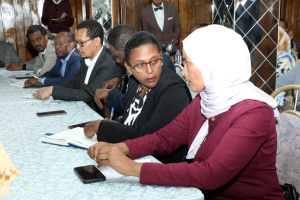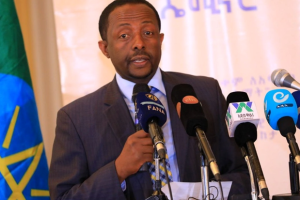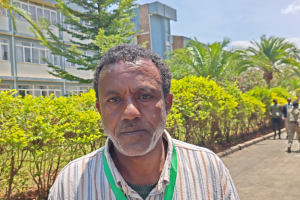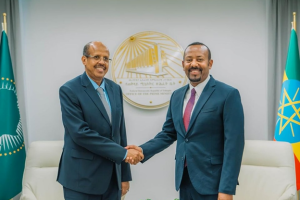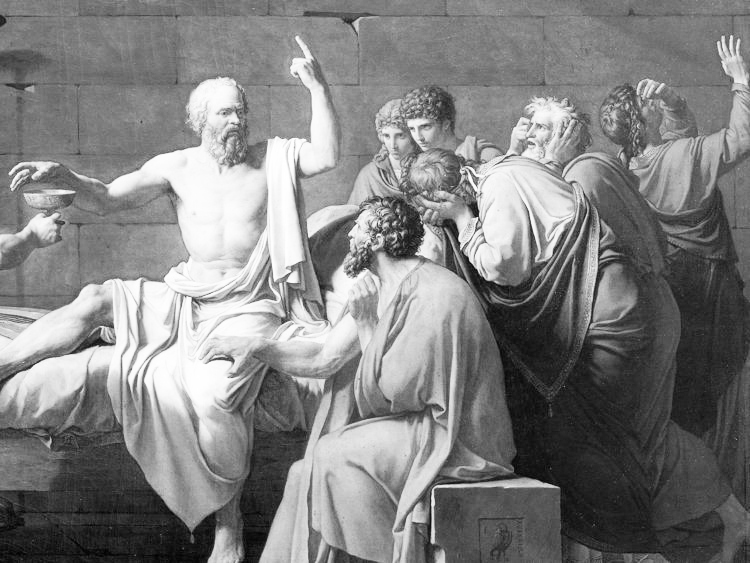
 On Thursday, 15 November 2018, over 600 students, teachers, invited guests, and others from the broader university community gathered together in Nelson Mandela Hall of AAU to celebrate the annual World Philosophy Day, as established by UNESCO in 2002.
On Thursday, 15 November 2018, over 600 students, teachers, invited guests, and others from the broader university community gathered together in Nelson Mandela Hall of AAU to celebrate the annual World Philosophy Day, as established by UNESCO in 2002.
The Department of Philosophy organized a half-day workshop consisting of speeches of invited guests, public lectures, student essays, and open discussion directed towards enhancing a better understanding within Ethiopian society regarding the essential role philosophy plays in human development.
The event began with a brief introduction by Professor Workineh Kelbessa, Chairperson of the Department of Philosophy of AAU. He stated that “The major aim of World Philosophy Day is clarifying the role that philosophy can play in solving the world’s deepest problems. It aims to show that reflection on the most basic assumptions about human nature and society can play a crucial role in making the world a happier and more peaceful place … Critical and expert thinking about what we should be trying to achieve together should play a very basic role in our shared life – because without clarity and insight about what is really good for us, no amount of investment, technology or commercial development will help us to find and maintain a just and stable human community”.
After briefly explaining the history of the Department, Kelbessa reminded those gathered that although there have been many important achievements over the past 65 years in the Department, many constraints and challenges persist. The Department was founded in 1951 as a sub-unit of the Faculty of Arts and Sciences, and is one of the oldest departments in AAU. However, it has not yet established its deserved place within academia and in the public sphere, as philosophy has been the most misunderstood subject in Ethiopia. Although Ethiopia has its own oral and written philosophical traditions, a considerable number of people have had negative attitudes towards philosophy and critical thinking. Furthermore, Professor Kelbessa stressed that there has been a widespread misapprehension about philosophy. Some people think that the study of philosophy in Ethiopia and other “developing” countries is a luxury such countries can’t afford.
This has had a very negative impact on the development of philosophy. However, philosophy, said Kelbessa, is not a luxury. In actual fact, the study of philosophy is a necessity. Philosophy can contribute a lot to solve the problems of “Developing” nations. He thus called on the university administration, the government and other stakeholders to enable the Department to be a center for excellence in research and teaching. Kelbessa suggested that the government should introduce relevant philosophy courses at different levels. According to Kelbessa, if the goal of the educational system is to create confident Ethiopian scientists, intellectuals, and citizens in a rapidly changing world, then children have to be encouraged to think creatively and critically from the very beginning.
Adults have to be challenged and encouraged to challenge themselves and others to be more deliberative and open to alternatives. Independent reasoning and respect for knowledge and truth have to be nurtured throughout society, but most especially in our educational system.
Therefore, the academic discipline philosophy, and more generally a philosophical culture, needs to be fostered and developed throughout the world, but most especially, here in Ethiopia.
Next up on the programme was the President of Addis Ababa University, Professor Tassew Weldehana, who gave the first opening speech. Professor Weldehana reminded the audience that a philosophical foundation is important in that it is through this that the fundamental questions of existence, knowledge and ethics could be understood. Without such an understanding our knowledge will lack a profound base.
Ms. Ana Elisa Santana De Afonso, Representative to Ethiopia and Director of the UNESCO Addis Ababa Liaison Office to the African Union Commission (AUC) and the Economic Commission for Africa (UNECA), praised the Department for celebrating World Philosophy Day since 2003, and read a speech from Ms.Audrey Azoulay, Director-General of UNESCO. She promised that UNESCO will continue to support the Department.
Following the welcoming speeches and a declaration officially opening the celebration three papers were presented. The first paper was presented by Dr. Jonathan David Trigg, a member of the Department of Philosophy, entitled: “Living Together Well: The Philosophical Foundations of Genuine Community”. He argued that only a shared understanding of human nature can provide the foundation for a genuinely shared life. He argued further that conceptions of human nature is derived from science (according to which people are really brains) and those derived from religion (on which people are really immaterial souls) are not only profoundly divisive, but also tend to make our ordinary moral convictions about how we should treat one another seem baseless and illusory. He said (following the great twentieth century philosopher Ludwig Wittgenstein) that we already have a shared non-theoretical understanding of ourselves that is implicit in the shared linguistic practices of, for example, asking and answering, thanking and rebuking, warning and greeting. This is a conception of ourselves as living beings (not brains or souls) endowed with the capacity to think, act and feel for reasons.
Trigg proposed that this non-theoretical conception is uniquely well suited to provide the foundation for a genuine human community. The challenge is to learn how to make it explicit without distorting it. This challenge is so hard to meet because of how deeply pre-occupied we tend to be with theoretical conceptions of ourselves inspired by science or religion.
In the second presentation, Dr. Christopher Bernard, a member of the Department, delivered a paper entitled: “Is the Incarnation a Contradiction?” According to Bernard, atheists and other critics of Christianity argued that the Christian doctrine of the Incarnation is incoherent.
According to Christian belief, Jesus is God incarnate. He is God in the flesh—truly God and truly human. Critics point out that this Christian doctrine is logically inconsistent because the essential properties of God and the essential properties of humanity are contradictory. God is all-powerful but humans are not. God is all-knowing but humans are not. So a being, like Jesus, cannot be both all-knowing and not all-knowing. He cannot be both all-powerful and not all-powerful.
Bernard briefly presented the work of former Notre Dame philosopher Thomas Morris in order to show that the critic has yet to prove an inconsistency. He did this by making a distinction between being fully human and being merely human. He argued that it is logically possible for Jesus to be fully human, having all the essential properties of human nature, while not being merely human. He made another distinction between a common human property and an essential human property and argued that critics of the Incarnation simply assume that common human properties, like not being all-knowing and not being all-powerful, as essential human properties. He argued that they need to go a step further and actually make an argument for some common human property also being an essential human property. He further argued that Christians, not surprisingly, develop a theory of human nature in a way that is compatible with a person being both truly God and truly human.
The third paper was on “Intercultural Discourse, Critique, Emancipation and Inclusion of the Other” by Fasil Merawi, a member of the Department and second year PhD Student. He engaged contemporary discussions in intercultural philosophy and critical theory in light of achieving a profound critique of grand ideological schemes, propounding a model for an emancipatory praxis and the inclusion of the other in the dominant discourse. Intercultural philosophy and critical social theory share a common interest in standing against grand metaphysical systems and centering on everyday centers of learning. Fasil argued that both approaches, (1) fail to go beyond the Eurocentric grand narrative of modernity, (2) both approaches ultimately run into the problem of value incommensurability and (3) both approaches fail to introduce a quasi-transcendental foundation. Finally he introduced an alternative model founded on the idea of multiple modernities.
During the lengthy discussion which followed the three presentations many interesting and vitally important questions arose.
The Department also organized a campus-wide student essay competition on “How Can We Best manage Diversities for Peaceful Co-existence in Ethiopia”. Finally, three students who won in an essay competition sponsored by Dr. Christopher Bernard were recognized.
Approximately four hours following its commencement World Philosophy Day, as celebrated in Ethiopia, came to a close with a vote of thanks by the Chairperson of the Department. Professor Kelbessa thanked all participants for honoring the invitation of the Department, and strongly advised them all to carry the good news of philosophical reflection to their colleagues
THE PHILOSOPHY DEPARTMENT OF AAU


